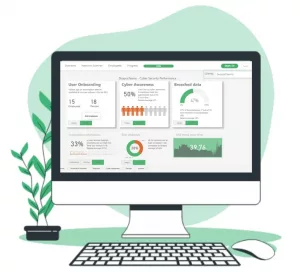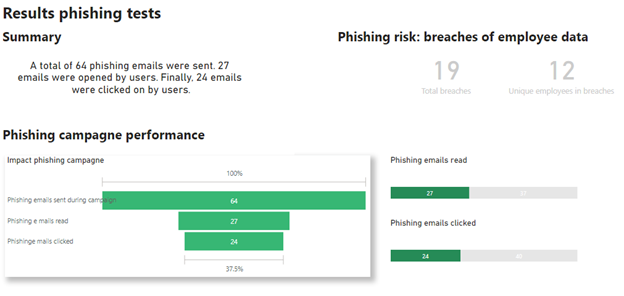Description of the project
Critical Infrastructure are attractive targets for hostile entities. While many critical infrastructures have implemented cyber security technologies, the issue of cyber risks identification across employees, contractors and service providers still remains a major concern, implying to require Contractors/Service Providers to prove that they also have implemented (expensive) cyber security systems.
The objective of the CyberSec2SME project is to give board members of the Port of Galati in Romania, a highly critical infrastructure, the assurance they need on the information security of their organisation and their vendor BeiA in the supply chain. The assurance will cover people, processes and the IT. Subcontractors, like BeiA in this project, can use the Skopos audit to demonstrate they are compliant.
Skopos.AI will deliver a continuous cyber audit on a highly complex and sensitive IT and Data environment of the Port of Galati. A process within the port is operated by contractor BeiA and BeiA systems. Skopos task is to detect, report, recommend and track progress and deliver a continuous dashboard delivering daily actionable insights, monthly executive reporting to keep the port secure. Reporting will be in line with ISO27001 and requirements for Critical Infrastructure.
BeiA employees are tasked with introducing real world risks and human errors. Skopos ́ task is to detect these risks in a timely matter and report, recommend & track progress. Assurance will be delivered via a secure operational dashboard and monthly executive reporting. The project will run for one year.

Mid-term project update
Cyber Threats Know No Boundaries: How CyberSec2SME Delivers Continuous Monitoring of Port Of Galati Supply Chain To Protect Critical Infrastructure
Cybersecurity risks are a constant concern for critical infrastructure businesses. The damage caused by a cyber attack can be catastrophic, both in terms of financial loss and reputational damage. To ensure the safety of the wider community, it is crucial to have a comprehensive understanding of the cyber security risks across the supply chain of suppliers. This is where the CyberSec2SME project comes in.
The project aims to secure the supply chain of the Port of Galati in Romania, a crucial component of the Romanian economy that handles over 10 million tonnes of cargo each year. The implementation of Lupasafe software on partner BeiA GmbH systems is a key part of the project. Lupasafe is a cyber security risk management platform that provides continuous monitoring of the supply chain, identifying any vulnerabilities or breaches in credentials.
In Phase 1 of the deployment, Lupasafe was successfully deployed at BEIA and Port of Galati endpoints, and risk data was collected from BEIA and Port of Galati employees for reporting and analysis. Tests were performed on employees, including cyber awareness, phishing, and dark web tests.
In Phase 2, the Lupasafe system was tested by purposely introducing errors and vulnerabilities. Lupasafe detected the vulnerabilities in time, and BeiA followed up on the findings. Multiple critical vulnerabilities were discovered, as highlighted by the Cybersecurity and Infrastructure Security Agency (CISA), a federal agency in the US that leads the national effort to defend critical infrastructure against cyber threats. The vulnerabilities discovered by Lupasafe were a result of outdated software and insecure configurations, emphasizing the importance of continuous monitoring and up–to–date security measures to reduce the risk of cyber attacks.
Lupasafe also performed phishing tests. Spearphishing is a common method used by hackers to target critical infrastructure. Lupasafe performed phishing tests on the employees of BeiA, and no risk was found, demonstrating the effectiveness of their cyber security measures.
Cybersecurity monitoring platform
Final project update
What is new is that the cyber risk data is automatically collected, classified, and analyzed per firm by a set of sensors. These sensors are monitoring the outside and inside of the firm on people, process, and technology. Cyber risk insights can be shown at supply chain level to give the Port of holistic overview. This is important as current measures like surveys and external scanning give an incomplete risk assessment. IT auditors can independently utilize the data to issue (non-)assurance reports, while IT partners gain valuable operational and tactical insights on how to secure firms through alerts and recommendations.
Phase 1 and 2 as well as the phishing tests were conducted as described above. The technology & results of CyberSec2SME have been presented by BeiA to the Port of Galati. The Port team were impressed with the results and evaluate future steps. This is a great result as it demonstrates the hard work meets the requirements of the target user group.
In conclusion, cyber threats know no boundaries, and it is essential to be proactive in managing these risks. Continuous monitoring of cyber security risks across the supply chain of suppliers is crucial for protecting critical infrastructure from devastating cyber attacks. By implementing a comprehensive cyber security strategy that includes continuous monitoring of cyber security risks, businesses can identify and mitigate potential risks before they become a problem, protect their operations, and ensure the safety of the wider community. The CyberSec2SME project is an excellent example of how businesses can protect their operations and the community from the catastrophic effects of cyber attacks.






